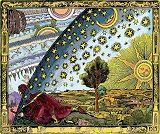The eye with which I see God is the same eye with which God sees me.

The eye with which I see God is the same eye with which God sees me.
– Meister Eckhart (c.1260–1327), German mystic
I am, as it were, an eye that the cosmos uses to look at itself.
– Rudy Rucker (1946– ), American mathematician and philosopher. This, and the preceding epigraph, are reminiscent of King Lear's lament: "And take upon us the mystery of things, As if we were God's spies."
I, Galileo Galilei, aged 70, arraigned before this tribunal of Inquisitors against heretical depravity, swear that I have always believed all that is taught by the Church. But whereas I wrote a book in which I adduce arguments of great cogency ... that the sun is the center of the world and immovable, and that the earth is not the center and moves, I abjure, curse, and detest these errors and heresies and I swear that I will never again assert anything that might furnish occasion for suspicion regarding me.
– Galileo Galilei (1564–1642), Italian astronomer who, threatened with torture by the Inquisition, here recants his belief that the earth moves around the sun (but cannot resist pointing out that his arguments do have "great cogency"). After delivering his retraction, he is said to have whispered under his breath, "But it does move!" He spent the rest of his life under house arrest making further astronomical discoveries and writing books for posterity. In 1992, an ecclesiastical commission appointed by Pope John Paul II acknowledged that Galileo had been right.
I now saw very plainly that these were little eels, or worms, lying all huddled up together and wriggling; the whole water seemed to be alive with these multifarious animalcules. I must say that no more pleasant sight has ever yet come before my eye than these many thousands of living creatures, seen all alive in a little drop of water, moving among one another, each creature having its own proper motion.
We cannot in any better manner glorify the Lord and Creator of the universe than that in all things, however small they appear to our naked eyes, but which have yet received the gift of life and power of increase, we contemplate the display of His omnificence and perfections with the utmost admiration.
– Anton van Leeuwenhoek (1632–1723), Dutch scientist, inventor of the microscope, describing the bacteria he was the first to see.
Sire, I found no need for that particular assumption.
– Pierre Simon Laplace (1749–1827), French mathematician and astronomer, in response to Napoleon, who had asked him what place was left to God in his system of celestial mechanics.
[The 21st] century will be defined by a debate that will run through the remainder of its decades: religion versus science. Religion will lose.
– John McLaughlin (1927– ), former Jesuit priest and TV talk show host
The writers of the Bible were ... as wise or as ignorant as their generation. Hence it is utterly unimportant that errors of historic or scientific fact should be found in the Bible.
– Monseigneur George Lemaître (1895–1966), Belgian Jesuit priest and physicist, Father of the Big Bang
Science without religion is lame, religion without science is blind.
The Lord God is subtle, but malicious he is not.
I am convinced that [God] does not play dice [with the universe].
My religion consists of a humble admiration of the illimitable superior spirit who reveals himself in the slight details we are able to perceive with our frail and feeble minds.
I am a deeply religious unbeliever.
– Albert Einstein (1879–1955)
The arc of the moral universe is long but it bends toward justice.
– Martin Luther King Jr. (1929–1968), American Civil Rights Leader and Nobel-laureate
Description demands intense observation, so intense that the veil of everyday habit falls away and what we paid no attention to, because it struck us as so ordinary, is revealed as miraculous.
– Czeslaw Milosz (1911–2004), Nobel-laureate Polish poet
The place where we do our scientific work is a place of prayer.
– Joseph Needham (1900–1995), British biochemist, sinologist, and historian of science
Religious feeling is as much a verity as any other part of human consciousness; and against it, on the subjective side, the waves of science beat in vain.
– John Tyndall (1820–1893), Irish physicist who explained why the sky is blue.
There is a grandeur in this view of life.
– Charles Darwin (1809–1882), English naturalist whose theory of evolution undermined theological dogma more than anything since Copernicus's heliocentric model of the solar system
I asserted that a man has no reason to be ashamed of having an ape for his grandfather. If there were an ancestor whom I should feel shame in recalling it would rather be a man who, not content with an equivocal success in his own sphere of activity, plunges into scientific questions with which he has no real acquaintance, only to obscure them by an aimless rhetoric, and distract the attention of his hearers from the real point at issue by eloquent digressions and skilled appeals to religious prejudice.
– Thomas Henry Huxley (1825–1895), English biologist making an ad hominem attack on Bishop Wilberforce for criticizing Darwin's theory of evolution
Basically, everything is one. There is no way in which you can draw a line between things. I think maybe poets have some understanding of this.
Every time I walk on grass I feel sorry, because I know the grass is screaming at me.
– Barbara McClintock (1902–1992), American Nobel prize-winning geneticist
If we do discover a complete theory, it should in time be understandable in broad principle by everyone, not just a few scientists. Then we shall all, philosophers, scientists, and just ordinary people, be able to take part in the discussion of the question of why it is that we and the universe exist. If we find the answer to that, it would be the ultimate triumph of human reason—for then we would know the mind of God.
– Stephen Hawking (1930– ), British physicist and author a best-selling but seldom-read book A Brief History of Time. The film version is more accessible.
You can talk about people like Buddha, Jesus, Moses, and Confucius, but the thing that really convinced me that such people exist were conversations with Niels Bohr.
– John A. Wheeler (1911–1908), leading American physicist who co-authored a seminal paper on nuclear fission with Niels Bohr
Formerly, when religion was strong and science weak, men mistook magic for medicine; now, when science is strong and religion weak, men mistake medicine for magic.
If you talk to God, you are praying; if God talks to you, you have schizophrenia.
– Thomas Szasz (1920– ), Hungarian-born American psychiatrist and writer
Medicine makes people ill, mathematics makes them sad, and theology makes them sinful.
– Martin Luther (1483–1546), German Protestant reformer
It is a strange and long war, the war that violence is forever waging against truth. All the efforts of violence are powerless to weaken truth, and serve only to make it stronger. All the lights of truth are powerless to stop violence, and serve only to make it angrier. Do not suppose, however, that the two are equal: there is one very great difference between them. The course of violence is directed by God who channels its effects to the exaltation of the truth it attacks; where truth subsists eternally and in the end triumphs over all its enemies, for it is eternal and powerful as God himself.
– Blaise Pascal (1623–1662), French scientist and philosopher
Though much has been written foolishly about the antagonism of science and religion, there is indeed no such antagonism. What all these world religions declare by inspiration and insight, history as it grows clear and science as its range extends display, as a reasonable and demonstrable fact, that men form one universal brotherhood, that they spring from one common origin, that their individual lives, their nations and races, interbreed and blend and go on to merge again at last in one common human destiny upon this little planet amidst the stars.
– H. G. Wells (1866–1946), British writer, from his Outline of History written in 1920.
Awe is an intuition of the dignity of all things, a realization that things not only are what they are but also stand, however remotely, for something supreme.
– Abraham Heschel (1907–1972), Polish-born American rabbi and philosopher




